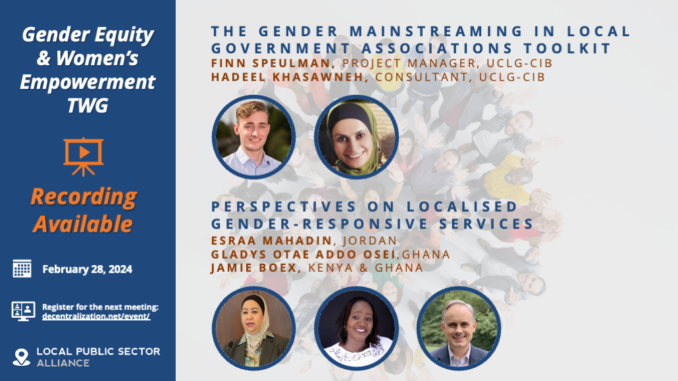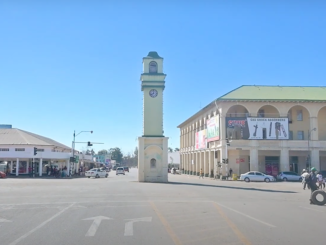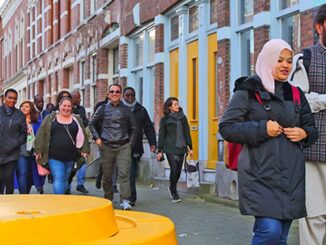
LPSA’s Thematic Working Group (TWG) on Gender Equity & Women’s Empowerment aims to bring together government officials, policy practitioners, scholars, civil society organizations, and citizens who share an interest and expertise at the intersection of decentralization/localization with gender equity and inclusive governance, including local women’s empowerment. The TWG on Gender Equity & Women’s Empowerment held an open meeting on February 28, 2024 (07:00 EDT / 13:00 CET / 15:00 EAT).
The meeting began with opening remarks and updates from Jacqueline Muthura, the Working Group coordinator. She also introduced the new co-chair, Hemanthi Goonasekera, Chief Executive Officer—Federation of Sri Lankan Local Govt. Authorities.
Finn Speulman, VNG International, illuminated the pivotal role of the UCLG Capacity and Institution Building (CIB) Working Group and elaborated on the CIB’s role in promoting gender equality through the development of the CIB Toolkit for Gender Mainstreaming for Local Government Associations and the CIB Gender Equality and Inclusive Governance Knowledge Hub.
Hadeel Khaswaneh presented the CIB Gender Equality Toolkit for Local Government Associations. Hadeel provided insights into the development process of the toolkit, including consultations with various local government associations worldwide to understand their specific challenges and needs regarding gender mainstreaming. Hadeel elaborated on the toolkit’s five sections, each addressing different aspects of gender mainstreaming within local government associations, from laying the foundation and measuring gaps to governance, leadership, internal operations, and service provision. Each section provides guidance and tools relevant to gender mainstreaming within LGAs. The toolkit also includes a diagnostic tool for LGAs to assess their current situation regarding gender mainstreaming.
Esraa Mahidin, the founder, and Executive Director of Karak Castle Center for Consultation and Training presented a case study from Jordan. The research conducted by the Karack Castle Center highlighted the obstacles faced by elected women in local councils in Jordan. She discussed challenges stemming from traditional and cultural norms, the gap between legislation and implementation, gender-based violence, and economic constraints faced by women. She concluded her presentation with recommendations for addressing these challenges, including involving men in training programs, working with media to change stereotypical portrayals of women, sharing success stories of women leaders, enhancing legal awareness among women, and economic opportunities for women. Esraa underscored the importance of comprehensive approaches involving women and men to achieve gender equality and women’s empowerment.
The Honorable Gladys Otae-Addo Osei, immediate former NALAG Women’s Caucus Representative and Assembly member for Ogbojo-Adenta Electoral Area in the Greater Accra Region, discussed the links between service delivery and gender outcomes, focusing on the Water, Sanitation, and Hygiene sector.
Jacqueline Muthura moderated the Q&A session, which concluded that empowering women benefits not just families but also local governments, economies, and countries. Local government initiatives need to address the relational aspect of gender and power dynamics within households for gender transformative change.
Prof. Jamie Boex presented an overview of the Localizing Women’s Economic Empowerment (WEE) Africa project. The project aims to promote the adoption, funding, and implementation of intergovernmental policy solutions for women’s economic empowerment.
Jamie highlighted Kenya’s progressive Constitution, which emphasizes gender equity but noted the gap between policy and implementation, particularly in childcare services at the county level. He identified ineffective multi-level governance and intergovernmental relations as hindrances to childcare provision.
LPSA will collaborate with Uthabiti Africa, Collaborative Action for Childcare in Kenya, the Institute for Local Government Studies in Ghana, and other stakeholders to develop and advocate for local-level WEE interventions and improved childcare through enhanced policymaking and implementation. Jamie emphasized the importance of collaboration and dialogue among stakeholders to effectively tackle these challenges.
A video of the meeting is available on YouTube. The links below provide access to the video segments of the different agenda items.
The next GEWE Working Group open meeting scheduled on May 29th, 2024. Reminder: You can join any LPSA Expert Working Group free of cost and receive reminders and updates by opting-in to one or more working groups as part of your LPSA Membership registration.
| No. | Agenda Item | Contributor |
| 1. | Welcome Remarks & LPSA Update | Jacqueline Muthura |
| 2. | The Gender Mainstreaming in Local Government Associations Toolkit | Finn Speulman Hadeel Khasawneh |
| 3. | Perspectives on Localized Gender-Responsive Services: Jordan, Ghana & Kenya | Esraa Mahadin Gladys Otae Addo Osei Jamie Boex |
| 4. | Q&A | Jacqueline Muthura |
| 5. | Closing & Any Other Business | Jacqueline Muthura |



